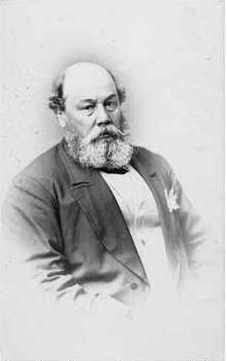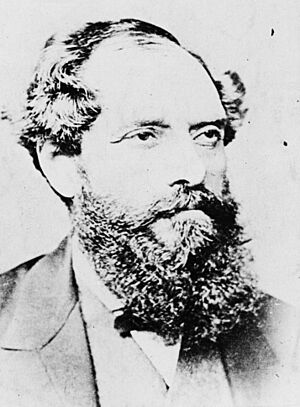Arthur Blyth facts for kids
Quick facts for kids
Sir Arthur Blyth
|
|
|---|---|
 |
|
| 9th Premier of South Australia | |
| In office 4 August 1864 – 22 March 1865 |
|
| Monarch | Victoria |
| Governor | Sir Dominick Daly |
| Preceded by | Henry Ayers |
| Succeeded by | Francis Dutton |
| In office 10 November 1871 – 22 January 1872 |
|
| Monarch | Victoria |
| Governor | Sir James Fergusson |
| Preceded by | John Hart |
| Succeeded by | Sir Henry Ayers |
| In office 22 July 1873 – 3 June 1875 |
|
| Monarch | Victoria |
| Governor | Sir Anthony Musgrave |
| Preceded by | Sir Henry Ayers |
| Succeeded by | James Boucaut |
| Personal details | |
| Born | 19 March 1823 Birmingham |
| Died | 7 December 1891 (aged 68) Bournemouth |
| Nationality | Australian |
| Spouse | Jessie Ann Forrest (m. 1850–1891; his death) |
| Occupation | Politician |
Sir Arthur Blyth (born 19 March 1823 – died 7 December 1891) was an important politician in South Australia. He served as the Premier of South Australia three different times. A Premier is like the leader of the government for a state or colony. His terms were from 1864–65, 1871–72, and 1873–75.
Contents
Early Life and Career
Arthur Blyth was born in Birmingham, England, in 1823. He went to school at King Edward's School, Birmingham. When he was 16, in 1839, he moved with his family to South Australia.
His father started a business selling metal goods and tools, called an ironmongery, in Hindley Street, Adelaide. Arthur and his brother Neville joined the family business.
Arthur Blyth quickly became interested in public service.
- He worked in local government, helping to manage the city.
- He was part of the central road board, which looked after roads.
- In 1855, he was elected to the old legislative council. This group helped create the new rules for how the government would work.
In 1857, he was elected to the first House of Assembly, which is like a parliament. He became the Commissioner of Public Works in 1858. This role meant he was in charge of public building projects. Later, in 1861, he became the Treasurer of South Australia. The Treasurer manages the money for the government.
He also served as president of the Royal Agricultural and Horticultural Society of South Australia from 1867 to 1868. This society helped farmers and gardeners.
Becoming Premier
Arthur Blyth became the Premier of South Australia for the first time on 4 August 1864. He was also the Commissioner of Crown Lands and Immigration. This meant he was in charge of government land and bringing new people to the colony. His first time as Premier was short, lasting until March 1865.
He continued to hold important roles in other governments.
- From 1866 to 1867, he was the Chief Secretary of South Australia. This is a very senior government position.
- He was Treasurer again in 1868.
- From 1870 to 1871, he was Commissioner of Crown Lands and Immigration again.
Leading South Australia Again
On 10 November 1871, Arthur Blyth became Premier for the second time. This term was also quite short, lasting only about ten weeks.
His third time as Premier began on 22 July 1873. This time, his government was more stable and lasted until June 1875. During this period, his government worked on several important things:
- They helped more people move to South Australia.
- They tried to pass a law for free, non-religious, and mandatory education. This law passed in the House of Assembly but not in the other house of parliament.
- They successfully passed a law to create the University of Adelaide. This was a big step for education in South Australia.
Later Life
In February 1877, Arthur Blyth was chosen to be the Agent-General for South Australia in London. This job meant he represented South Australia's interests in the United Kingdom. He did this job well for many years.
He was also involved with the Oxford Military College in England. In 1887, he represented South Australia at a big meeting of leaders from different British colonies.
Sir Arthur Blyth passed away in Bournemouth, England, on 7 December 1891.
Family Life
Arthur Blyth married Jessie Ann Forrest in 1850. She passed away just two weeks after him in December 1891.
His younger brother, Neville Blyth, was also a politician in South Australia.
Arthur and Jessie had several children:
- Emily Grant Blyth
- (John) James Neville Blyth
- Frances Eleanor Blyth
Recognition and Legacy
Arthur Blyth was honored for his service:
- He was made a Knight Commander (KCMG) in 1877. This is a special award from the British Crown.
- He was also appointed a Companion (CB) in 1886.
Several places in Australia were named after him:
- The Hundred of Blyth in South Australia, and the town of Blyth, were named in his honor in 1860.
- The Blyth River in the Northern Territory was named after him in 1867.
- The Hundred of Blyth in the Northern Territory was also named for him in 1871.
The Hundred of Jessie and possibly the town of Jessie were named after his wife, Jessie.


